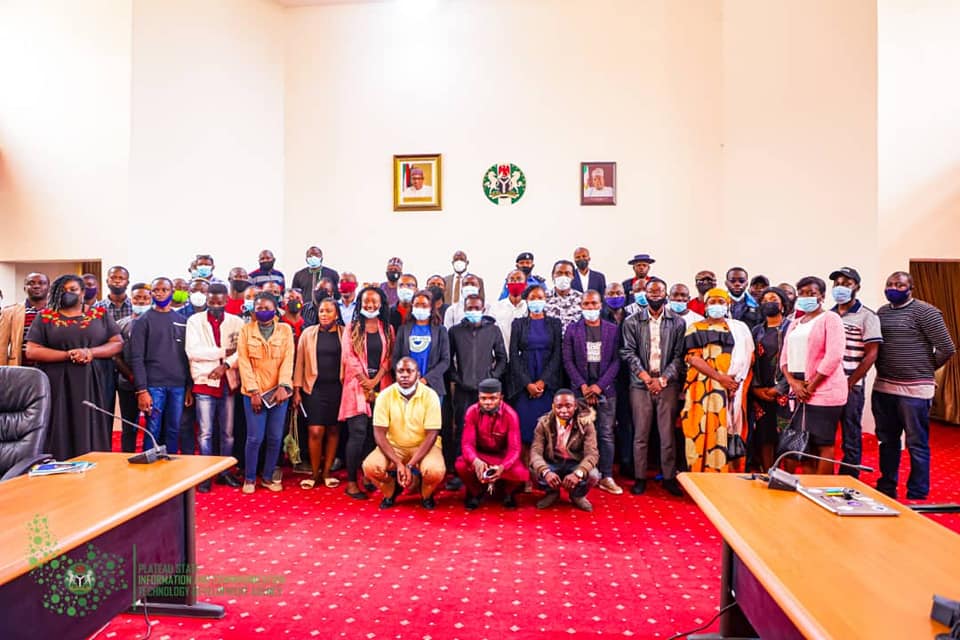The Plateau state government has officially moved to stop security operatives from harassing and labelling tech workers in the state as internet scammers.
This week in Jos, Governor Simon Lalong, through the Plateau State Information and Communication Technology Agency (PICTDA) hosted an interactive meeting with stakeholders including software developers, remote and creative workers, tech freelancers, and security operatives from the police and the Nigeria Security and Civil Defence Corps among others.
The meeting is part of the initial steps at building cross-sector understanding and granting protection to all digital workers, techpreneurs living in Plateau state against any form of harassments.
“Today at the old Government House, we re-instated our commitment towards making Plateau State a conducive environment for tech freelancers, remote developers and creatives.
“We had a parley discussion with the various security agencies and young people within the technology and creative sector on the new virtual work force of the 21st century and why we must allow it thrive,” said Director General, PICTDA, David Daser.
Plateau pioneers protection of digital workers and industry
A first in a country with the largest tech ecosystem on the African continent, security operators have gained notoriety for frequent illegal shakedowns of software developers and other virtual workers in Nigeria’s booming tech industry.
“Cyber security has become a thing of concern lately and as much as fraudulent activities keep rising, the government of Plateau state is aware that there are those who are genuinely working virtually and deserves to be protected.
“We have taken time to sensitise the security agencies on the new virtual workforce and why these young people deserves to be protected. In the coming days we would be issuing statement on the new profiling guidelines,” said the PICTDA’s boss.
Plateau in central Nigeria is pioneering a solution to deepen understanding between security agencies and Nigeria’s growing army of digital workers. The ultimate plan is to protect a sector contributing over 14% to the GDP of Africa’s largest economy that just exited recession owing to its booming tech industry.
“That you carry a laptop bag would no longer mean you are a fraudster as you would be given identification that is verifiable by security personnel and also a desk office to be created within PICTDA and the Police Headquarters for such purpose. Jos now welcomes all remote developers, freelancers and creative workers who are looking for where to settle and work from. Governor Lalong is working towards creating the best technology ecosystem in West Africa,” said Daser.
According to him, “all virtual workers who work within the tech and creative ecosystem would now be documented to enable ease of business and protection of lives and future of the emerging virtual workforce community in Plateau state.”
“Government will continue to lead in building engagements among stakeholders and providing the necessary platform to build mutual understanding particularly for young people in order to continuously encourage them to build within the context of 21st century economy,” said Commissioner for Science and Technology, Gyang Musa who reiterated Governor Lalong’s untiring efforts towards ensuring a more friendly environment for innovation and technology growth.
Tech industry under siege
Harassment of software developers and other virtual workers has increased in the last decade in Nigeria.
In 2019, a harassed tech industry launched the #StopRobbingUs campaign to end police brutality against young practitioners in the industry and end “the common practice where Nigerian police stop young people with laptops and unlawfully arrest, attack or, in extreme circumstances, kidnap them, forcing them to withdraw funds from their bank accounts in order to regain their freedom.”
In 2020, the campaign morphed into the #ENDSARS movement aimed at demanding accountability and reform of the police notably the now moribund Special Anti-Robbery Squad (SARS).
Also earlier in 2019, the Nigerian government through the Ministry of Communication and Digital Economy, warned security operatives against harassing tech workers in the country as fraudsters fearing that such incessant actions could will stifle a very sector of the economy.


































